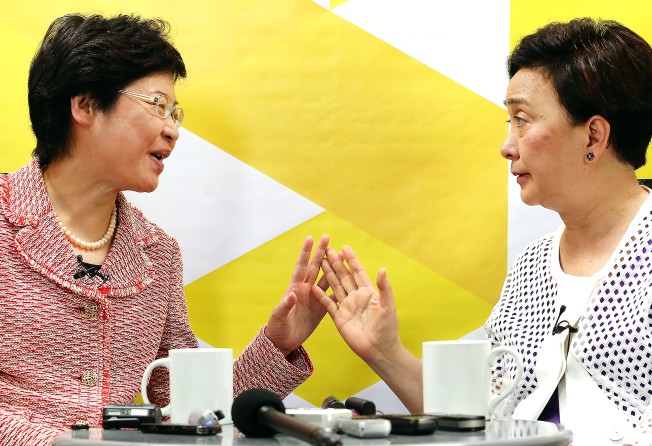Carrie Lam says reform package is no endgame for Hong Kong democracy

Chief Secretary Carrie Lam Cheng Yuet-ngor, who is helming the government’s effort to promote its political reform package, on Thursday dismissed pan-democrats’ accusations that she suggested approving the plan would be the “the endgame” in the fight for democracy.
Lam said in the Legislative Council that she only meant to say the electoral model could be reformed after universal suffrage was introduced in the 2017 chief executive election.
She urged the pan-democrats “to set aside the ideals and their democratic demands, consider Hong Kong’s big picture and long-term interest as their priority and abandon their vow to veto the package.”
On Wednesday last week, Lam said, “After the chief executive is selected by way of universal suffrage through ‘one person, one vote’ by all eligible voters of Hong Kong in 2017, the ultimate aim of the selection of the chief executive … as prescribed in Article 45 of the Basic Law, will have been attained.”
Civic Party leader Alan Leong Kah-kit took Lam to task for the remarks, which he said showed Lam believed approving the reform package would be the “the endgame” in the fight for democracy. The pan-democrats plan to launch a street campaign to warn residents against such an endgame.
Addressing a Legco subcommittee on the reform proposal on Thursday morning, Lam said she wanted to make a “serious clarification” that the pan-democrats misinterpreted her remarks.
“I also said that morning that the Basic Law already provided a clear legal basis for initiating such further amendments to the method for selecting the chief executive,” Lam said. “And whether to amend and to initiate the relevant amendment procedures will have to be considered by the [future] chief executive in accordance with the actual situation prevailing at that time.”
But the pan-democratic camp refused to accept Lam’s explanation this morning.
Leong, Labour Party chairman Lee Cheuk-yan and NeoDemocrat lawmaker Gary Fan Kwok-wai accused Lam of “deceiving” Hongkongers.
Referring to the government’s proposal that two or three candidates will be put forward for the public ballot after they have secured the majority support of a 1,200-strong nomination committee, Lee said that Lam “argued that public opinion would be able to influence the chief executive, but now the 1,200 is more influential than the five million eligible voters” because they can screen candidates.
But Starry Lee Wai-king, chairwoman of the Beijing-loyalist Democratic Alliance for the Betterment and Progress of Hong Kong, argued that it was actually the pan-democrats, not the government officials, who were deceiving Hongkongers.
“If they veto the package, it is tantamount to supporting electing the chief executive by the 1,200 [members of the Election Committee in 2012], and vetoing the reform to achieve universal suffrage for the Legco 2020,” Lee said.
Meanwhile, Jack So Chak-kwong, the outgoing chairman of the Trade Development Council, urged pan-democrats to support the government’s reform proposal.
Speaking on DBC radio this morning, So said he hoped pan-democrat lawmakers would pass the reform plan. “I respect their ideals but at the same time I sincerely hope and urge that they will accept the proposal,” he said.
“What Hongkongers don’t want to see is the current deadlock, in which everyone argues with each other and is unwilling to make concessions,” he said.
“If we stop here, we will not have political momentum to launch other … reforms, including one to fully democratise the legislature,” he said.
He said this would be a “once in a life time” chance to make the electoral method more democratic, and it could be further refined after implementing the current proposal in 2017.